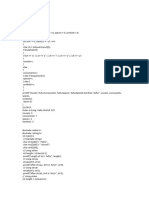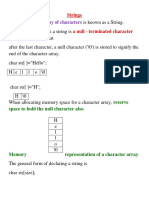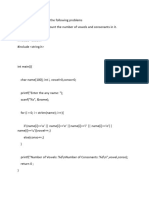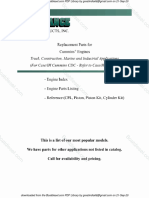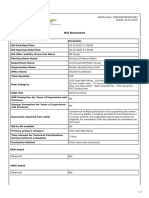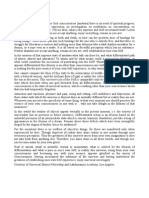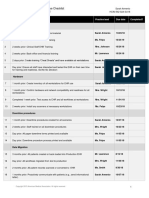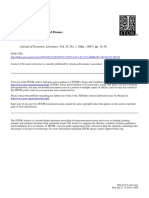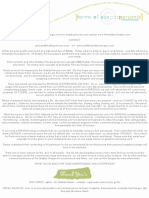1. Write a program to accept two strings str1 and str2. Compare them.
If they are equal, display their length. If str1 < str2, concatenate
str1 and the reversed str2 into str3. If str1 > str2, convert str1 to
uppercase and str2 to lowercase and display. Refer sample code for
string functions above.
#include <stdio.h>
#include <string.h>
#include <ctype.h>
void str_reverse(char str[]) {
int len = strlen(str);
int i, j;
char temp;
// Reverse the string
for(i = 0, j = len - 1; i < j; i++, j--) {
temp = str[i];
str[i] = str[j];
str[j] = temp;
}
}
int main() {
char str1[100], str2[100], str3[200];
int comparison,i;
// Accept input strings
printf("Enter the first string (str1): ");
fgets(str1, sizeof(str1), stdin);
str1[strcspn(str1, "\n")] = '\0'; // Remove newline character
printf("Enter the second string (str2): ");
fgets(str2, sizeof(str2), stdin);
str2[strcspn(str2, "\n")] = '\0'; // Remove newline character
// Compare the strings
comparison = strcmp(str1, str2);
if (comparison == 0) {
// If str1 and str2 are equal, display their length
printf("The strings are equal.\n");
printf("Length of str1 and str2: %d\n", strlen(str1));
} else if (comparison < 0) {
// If str1 is lexicographically less than str2, concatenate str1 and
the reversed str2 into str3
str_reverse(str2); // Reverse str2
strcpy(str3, str1); // Copy str1 into str3
strcat(str3, str2); // Concatenate reversed str2 into str3
printf("str1 < str2, the concatenated string is: %s\n", str3);
} else {
// If str1 is lexicographically greater than str2, convert str1 to
uppercase and str2 to lowercase
for ( i = 0; str1[i]; i++) {
str1[i] = toupper(str1[i]);
}
for (i = 0; str2[i]; i++) {
str2[i] = tolower(str2[i]);
}
printf("str1 > str2, str1 in uppercase: %s\n", str1);
printf("str2 in lowercase: %s\n", str2);
}
return 0;
}
2.Write a menu driven program to perform the following operations on
strings using standard library functions:
Length Copy Concatenation Compare
#include <stdio.h>
#include <string.h>
int main() {
char str1[100], str2[100], result[200];
int choice;
// Menu driven loop
do {
printf("\nMenu:\n");
printf("1. Find Length of a String\n");
printf("2. Copy One String to Another\n");
printf("3. Concatenate Two Strings\n");
printf("4. Compare Two Strings\n");
printf("5. Exit\n");
printf("Enter your choice: ");
scanf("%d", &choice);
getchar(); // To clear the newline character left by scanf
switch(choice) {
case 1:
// Length of a string
printf("Enter a string: ");
fgets(str1, sizeof(str1), stdin);
str1[strcspn(str1, "\n")] = '\0'; // Remove newline character
printf("Length of the string: %lu\n", strlen(str1));
break;
case 2:
// Copy one string to another
printf("Enter the source string: ");
fgets(str1, sizeof(str1), stdin);
str1[strcspn(str1, "\n")] = '\0'; // Remove newline character
// Copy str1 into str2
strcpy(str2, str1);
printf("Source string copied to destination: %s\n", str2);
break;
case 3:
// Concatenate two strings
printf("Enter the first string: ");
fgets(str1, sizeof(str1), stdin);
str1[strcspn(str1, "\n")] = '\0'; // Remove newline character
printf("Enter the second string: ");
fgets(str2, sizeof(str2), stdin);
str2[strcspn(str2, "\n")] = '\0'; // Remove newline character
// Concatenate str1 and str2 into result
strcpy(result, str1); // Copy str1 to result
strcat(result, str2); // Concatenate str2 to result
printf("Concatenated string: %s\n", result);
break;
case 4:
// Compare two strings
printf("Enter the first string: ");
fgets(str1, sizeof(str1), stdin);
str1[strcspn(str1, "\n")] = '\0'; // Remove newline character
printf("Enter the second string: ");
fgets(str2, sizeof(str2), stdin);
str2[strcspn(str2, "\n")] = '\0'; // Remove newline character
// Compare the strings
int cmpResult = strcmp(str1, str2);
if (cmpResult == 0) {
printf("The strings are equal.\n");
} else if (cmpResult < 0) {
printf("The first string is lexicographically smaller than the second.\n");
} else {
printf("The first string is lexicographically greater than the second.\n");
}
break;
case 5:
printf("Exiting program...\n");
break;
default:
printf("Invalid choice. Please try again.\n");
}
} while(choice != 5);
return 0;
}
3. C program that counts the occurrences of a specific character in a given string:
#include <stdio.h>
int main() {
char str[100], ch;
int count = 0,i;
// Input the string
printf("Enter a string: ");
fgets(str, sizeof(str), stdin);
// Input the character to be searched
printf("Enter the character to count: ");
scanf("%c", &ch);
// Loop through the string and count occurrences of the character
for ( i = 0; str[i] != '\0'; i++) {
if (str[i] == ch) {
count++;
}
}
// Output the result
printf("The character '%c' appears %d times in the string.\n", ch, count);
return 0;
}
4.A palindrome is a string that reads the same-forward and reverse. Example:
“madam” is a Palindrome. Write a function which accepts a string and
returns 1 if the string is a palindrome and 0 otherwise. Use this function in
main.
#include <stdio.h>
#include <string.h>
// Function to check if a string is a palindrome
int isPalindrome(char str[]) {
int start = 0;
int end = strlen(str) - 1;
while (start < end) {
// Skip non-alphanumeric characters if needed (you can modify this
part as per requirements)
if (str[start] != str[end]) {
return 0; // Not a palindrome
}
start++;
end--;
}
return 1; // Is a palindrome
}
int main() {
char str[100];
// Input the string
printf("Enter a string: ");
fgets(str, sizeof(str), stdin);
// Remove newline character from fgets input
str[strcspn(str, "\n")] = '\0';
// Check if the string is a palindrome
if (isPalindrome(str)) {
printf("The string is a palindrome.\n");
} else {
printf("The string is not a palindrome.\n");
}
return 0;
}
5.Write a program which accepts a sentence from the user and
alters it as follows: Every space is replaced by *, case of all
alphabets is reversed, digits are replaced by ?
#include <stdio.h>
#include <ctype.h>
void alterString(char str[]) {
int i;
// Iterate through each character of the string
for (i = 0; str[i] != '\0'; i++) {
if (str[i] == ' ') {
str[i] = '*'; // Replace space with '*'
}
else if (isdigit(str[i])) {
str[i] = '?'; // Replace digits with '?'
}
else if (isalpha(str[i])) {
if (isupper(str[i])) {
str[i] = tolower(str[i]); // Convert uppercase to lowercase
} else {
str[i] = toupper(str[i]); // Convert lowercase to uppercase
}
}
}
}
int main() {
char sentence[200];
// Accept the input sentence
printf("Enter a sentence: ");
fgets(sentence, sizeof(sentence), stdin);
// Call the function to alter the string
alterString(sentence);
// Output the altered sentence
printf("Altered sentence: %s", sentence);
return 0;
}
6.Write a program that accepts n strings and displays the longest string.
#include <stdio.h>
#include <string.h>
int main() {
int n,i;
// Accept the number of strings
printf("Enter the number of strings: ");
scanf("%d", &n);
getchar(); // To clear the newline character left by scanf
char str[n][100]; // Array to store n strings
char longest[100]; // To store the longest string
int maxLength = 0;
// Accept n strings
for ( i = 0; i < n; i++) {
printf("Enter string %d: ", i + 1);
fgets(str[i], sizeof(str[i]), stdin);
str[i][strcspn(str[i], "\n")] = '\0'; // Remove the newline character
}
// Find the longest string
for ( i = 0; i < n; i++) {
if (strlen(str[i]) > maxLength) {
maxLength = strlen(str[i]);
strcpy(longest, str[i]); // Copy the longest string into 'longest'
}
}
// Display the longest string
printf("The longest string is: %s\n", longest);
return 0;
}










